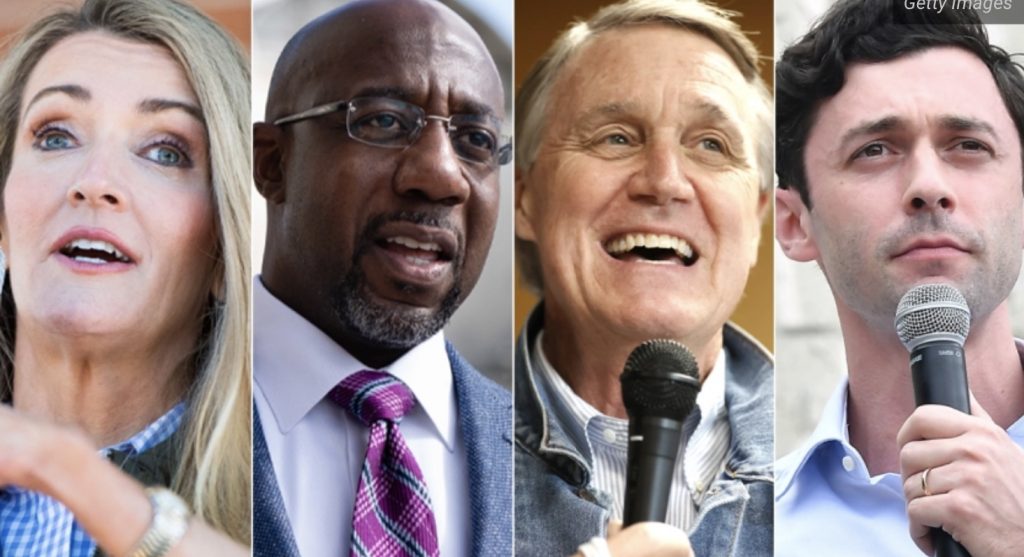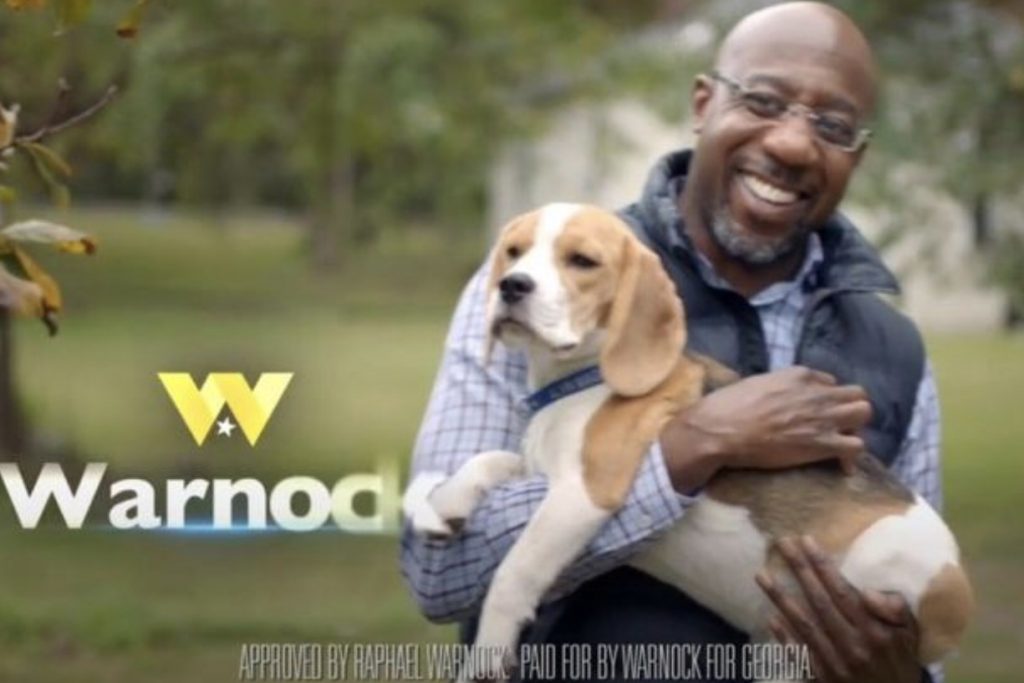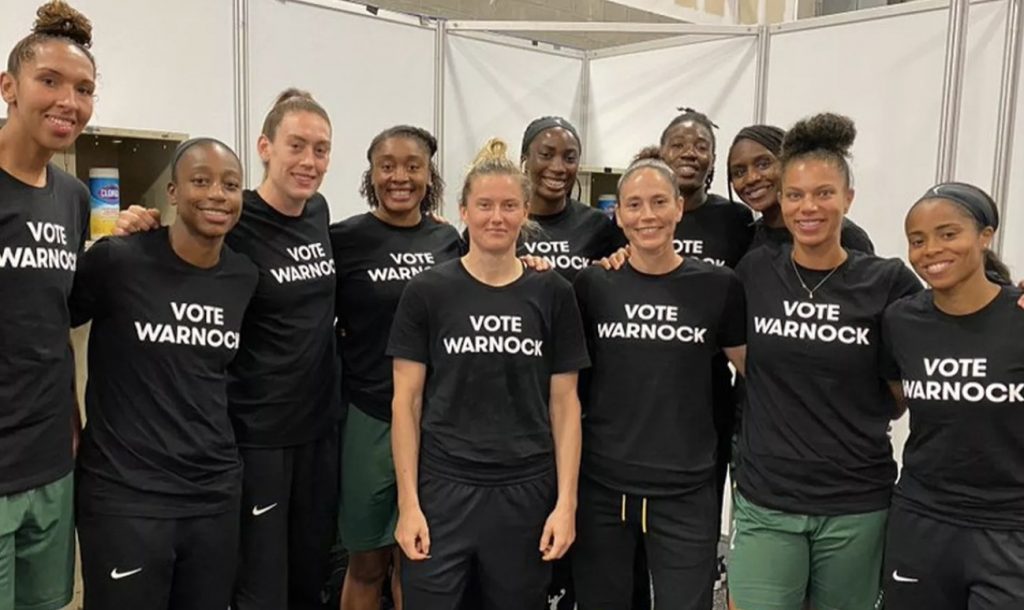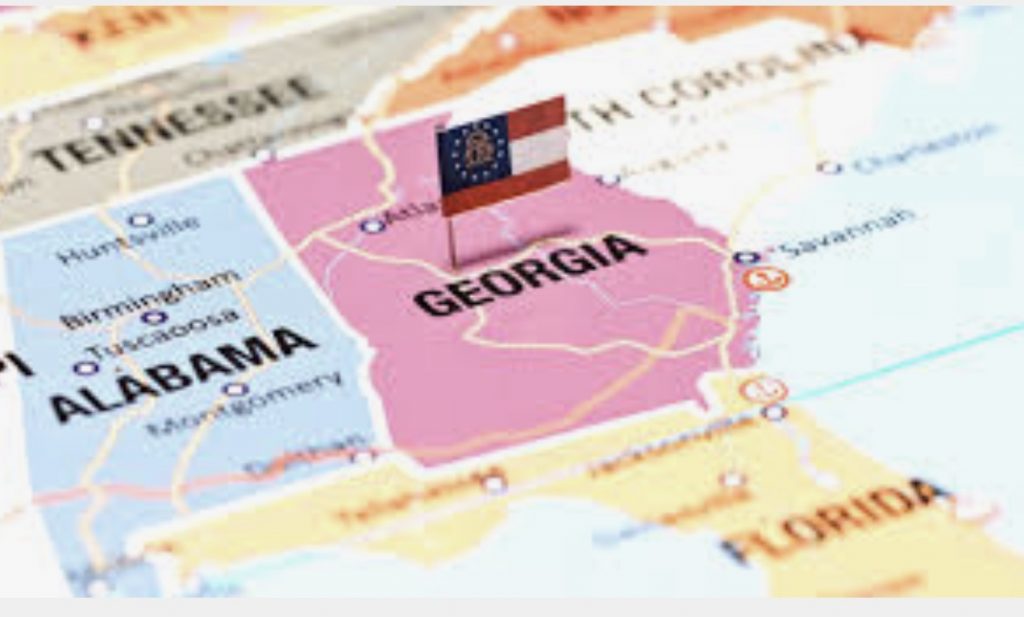
Georgia Senate Runoff: Perdue vs Ossof; Loeffler vs Warnock
The world is watching Georgia. The Senate Runoff races have garnered global attention and the Senate stands in the balance. What do we know?
The Tone. The tone of the ads and candidate messages couldn’t be more different. Kelly Loeffler’s campaign ads usually feature dark grim views of Warnock with a repetitive message of Warnock being radical, dangerous and unpatriotic. Raphael Warnock’s campaign ads are bright, positive and sunny, while he talks about health care, his family story, focus on Christianity and liking puppies.

So which will have the biggest impact? It could work. Loeffler’s approach — a familiar playbook tailored to older, whiter voters who skew Republican — uses scare tactics, saying vote to save America from socialism. However, with Georgia’s changing demographics, are Loeffler’s ads out of step with a changing electorate. Will the pitting of the Old South with thinly-veiled racist rhetoric and maintenance of the predominantly white status quo hold up against the New South’s increasingly young and racially diverse constituency. This fundamental tension is shaping the contours of the messaging wars in the Senate race — and could reverberate in the broader region for decades to come.
Republicans remain confident that their strategy is effective, one that appeals to both their predominantly white voting base and communities of color.
“Democrats have painted themselves as radicals,” said David Shafer, chair of the Georgia Republican Party. “There’s no demographic that’s in favor of defunding the police. I think concern for personal safety is an issue that transcends ethnic lines.”

Donald Trump and Mike Pence’s visit to Georgia on Saturday gives the state GOP an opportunity to shore up enough voter support to maintain control of the Senate. But Georgia’s voters are changing. The state has seen an influx of young people of color and college educated voters of all races, which has boosted the population by nearly 10% over the last decade, according to census data. Immigrants from Latin America, Asia and Jamaica also account for these changes. The immigrant population jumped 84 percent between 2010 and 2018, putting Georgia on the fast track to become majority-minority by 2030. Black, Latino and Asian voters in the once-Republican Atlanta suburbs helped deliver the state for Joe Biden in November.
Republicans, meanwhile, have focused on wooing old Georgia. That approach was effective in 2001, when a debate over the Confederate emblem from the state flag helped cinch Republican political dominance in Georgia for more than 15 years. Let’s not forget, Brian Kemp’s gubernatorial campaign in 2018, when he boasted of “rounding up criminal illegals” in his pickup truck. Now, Republicans are hoping that their vilification of Warnock as a radical, dangerous figure will be enough to sink his campaign.
“It’s really driving that point home to Georgia voters to make sure they understand,” said Stephen Lawson, Loeffler’s communications director. “If they vote on January 5, we win. If they don’t vote, that’s what we’re gonna get in the United States Senate.” Fear is being used to drive votes.
With two Senate seats up for grabs in the January 5 runoffs, Democrats see an opportunity to push through new, more ambitious policies that Republicans decry as “radical” and “socialist.” And Republicans are trying to motivate Georgia voters to “hold the line” by reelecting Loeffler and Sen. David Perdue, who is facing off against Jon Ossoff, a Democrat from Atlanta. But the policy concerns conservatives have outlined are quickly being conflated with racial ones.
“There’s a third rail of politics in the South. And it’s race,” said Roy Barnes, Georgia’s last Democratic governor. In 2001, he led the effort to remove the Confederate Battle Flag design from the state flag, which contributed in part to his unsuccessful bid for reelection in 2002. He lost to Sonny Perdue, whose campaign promise to hold a referendum to change the flag again helped him consolidate support among rural white voters.
Now, said Barnes, Republicans are using dog whistles at their own peril, particularly as the state’s racial makeup changes. And with heightened sensitivity towards issues of race in Georgia and the rest of the country, he said, that messaging is “dangerous for the country and for the state.” Even WNBA players on Loeffler’s team are encouraging votes for Warnock.

“I think the personal attacks are wearing thin, very thin, and that very well could backfire,” Barnes said. “I just can’t imagine that appeals to anybody.”
Some Republicans, too, are wary of the strategy, arguing the state’s changing demographics present an opening for the GOP to expand its outreach to communities of color.
“You have to be careful in attacking an African American candidate in the South because it will have negative reverberations with independents in the suburbs,” said Heath Garrett, former campaign manager to former GOP Sen. Johnny Isakson, whose seat Loeffler now occupies. “I think some of the attacks are helping motivate the base. But they have to walk a very fine line. Because otherwise they’re simply motivating Democratic voters.”
But this isn’t new. Back in 1970, when Andrew Young first ran for Congress, Republicans circulated pamphlets with a photo of Young, unshaven and in overalls, with a caption reading, “If Andrew Young is elected, the Black Panthers are going to get your daughter,” Young recalled. Those tactics are still in play today, he said.
“We’re in such a time when propaganda dominates,” said Young, who, after serving in Congress, was the mayor of Atlanta and ambassador to the United Nations. “Most of the South still carries a burden of guilt and shame about race questions.”

But the South is Changing. Georgia Democrats understood as early as 2013 that the state’s fast-changing demographics made it ripe for a leftward shift, particularly as the film industry set up camp in Atlanta. Virginia, whose increased population of young people, college graduates and people of color helped turn it blue in 2016 and 2020, is further proof to liberals that the South is still in play; they have eyed Texas, North Carolina and Florida as viable targets. As these populations grow, statisticians predict they will continue to shift blue.
“The younger generation is going to continue to be more likely to be people of color, and even the white populations … will tend to be more college educated whites than it was in the past,” said Bill Frey, a demographer and senior fellow at the Brookings Institution. “The reason Georgia has stayed Republican all these years, even though they had a large Black population, is because whites voted so dramatically Republican that it countered the demographics of the rest of the population.”
Still, it is clear the Republican playbook still holds sway with a large number of Georgia voters. David Perdue has painted Ossoff, who is white, as a young, inexperienced candidate beholden to a “socialist agenda.” His approach clearly resonated: The Republican earned nearly 90,000 more votes than Ossoff in the general election. And despite footage released early in her candidacy that showed her espousing racist and Islamophobic beliefs, QAnon supporter Marjorie Taylor Greene handily won her House race — in one of the most conservative House districts in the country — by nearly 50 points.
“Everybody complains about attack ads, but if they didn’t work, you wouldn’t see them in every single election,” said former Georgia Rep. Jack Kingston, a Republican. “People are concerned about Mr. Warnock’s comments” about policing and the military, Kingston said, clips of which are the basis of many Republican ads in the state.
“Hard-hitting ads are just part of it. The strongest persuasion ad there is is when you convict a candidate in his or her own words.”
Lawson said the campaign’s aim in tagging Warnock as a radical is to get Georgia voters to understand “who he is and what the stakes are.” As an example, he pointed to Warnock’s past comments in support of Jeremiah Wright, a Black religious leader whose controversial 2008 sermon was a flashpoint of Republican attacks against Barack Obama.
When asked if the ads may alienate a wide swath of Black voters in Georgia who hold Warnock in high regard due to his role as senior pastor of Ebenezer Baptist Church, Martin Luther King’s former post, Lawson said Warnock’s words cross “party lines.”
“It crosses backgrounds, it transcends race,” he said. “His statements are divisive and in many cases hurtful. That’s really, I think, the takeaway there.”
Even so, Loeffler switched tactics this week, releasing a positive ad highlighting her relationship to Black Georgians. In it, Janelle King, a Black conservative strategist, says that Loeffler is the best Senate candidate for Georgia because she can “write paychecks, sign paychecks and knows how it feels like waiting on that paycheck.”
But Democrats fight back. Carolyn Bourdeaux, who won one of a handful of down-ballot Democratic victories in Georgia, faced similar attacks from her Republican opponents during her House race. One ad described her as a “dangerous reckless extremist” who has “taken cash from groups who want to defund … the police,” which Democrats have cited as an anchor to their effort to expand their House majority. Bourdeaux said she decided to ignore Republican attack ads and focuses on policy points instead.
“I try to sum it up by saying I’m here to take a passionate stand for the common-sense solutions that people in this district need,” said Bourdeaux, the only Democrat to flip a red seat this election. “And then combine it with building and engaging with the diverse communities that are now in Georgia.”
Recently, Democrats have started punching back on the airwaves. Several ads paid for by the Warnock and Ossoff campaigns as well as Democratic groups portray Republicans as corrupt, accusing Loeffler and Perdue of “profiting from the pandemic.”
Right after the general election, Warnock released a parody ad, joking about the ways in which Loeffler would try to paint him as a bad guy. His latest television spot, released in late November, took a more direct hit at Loeffler.
“You would think that Kelly Loeffler might have something good to say about herself if she really wants to represent Georgia. Instead, she’s trying to scare people about taking things I’ve said out of context from over 25 years of being a pastor,” Warnock says while walking a puppy. Before dropping the dog’s waste in a trash can, he asks, “I think Georgians will see her ads for what they are, don’t you?”







